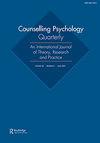Patients’ attachment avoidance and their perceived quality of the real relationship predict patients’ attitudes towards telepsychotherapy
IF 1.6
Q3 PSYCHOLOGY, APPLIED
引用次数: 3
Abstract
ABSTRACT During the early months of the COVID-19 pandemic, patients in individual psychotherapy needed to suddenly transition to telepsychotherapy (TPT), and for many patients it was their first experience of remote treatment. Since TPT appears to be here to stay after the pandemic ends, it is crucial to understand which factors determine whether TPT is a good fit for patients. We aimed to examine patients’ relational predictors, both trait- (attachment avoidance and attachment anxiety) and state-like (working alliance, real relationship) of patients’ attitudes towards TPT, and the potential mediating role of state-like relational variables between trait-like variables and attitudes. We used a longitudinal design, where patients (N = 719) who were in individual TPT participated in an online survey at the beginning of the pandemic and at follow-up three months later. Patients completed measures of symptom severity, Covid-related distress, attachment anxiety and avoidance, perceived quality of the therapeutic relationship (working alliance and real relationship), and attitude towards TPT. Results suggested that higher levels of attachment avoidance predicted more negative attitudes towards TPT, and that patient-reported quality of the real relationship in their TPT sessions mediated this negative relationship between attachment avoidance and attitudes towards TPT. Patient’s attachment avoidance and the real relationship are important predictors of patients’ attitudes towards TPT, and could indicate suitability of the TPT format, as well as inform clinicians’ efforts in building a real and genuine connection with their patients online.患者的依恋回避和对真实关系的感知质量可以预测患者对远程心理治疗的态度
摘要在新冠肺炎大流行的最初几个月,个体心理治疗患者需要突然过渡到远程心理治疗(TPT),对许多患者来说,这是他们第一次体验远程治疗。由于TPT似乎会在疫情结束后继续存在,因此了解哪些因素决定TPT是否适合患者至关重要。我们旨在检验患者对TPT态度的关系预测因素,包括特质(依恋回避和依恋焦虑)和状态样(工作联盟,真实关系),以及状态样关系变量在特质样变量和态度之间的潜在中介作用。我们使用了一项纵向设计,在大流行开始时和三个月后的随访中,接受个体TPT的患者(N=719)参加了一项在线调查。患者完成了症状严重程度、新冠肺炎相关痛苦、依恋焦虑和回避、治疗关系(工作联盟和真实关系)的感知质量以及对TPT的态度的测量。结果表明,越高水平的依恋回避预示着对TPT的负面态度越多,而患者报告的TPT会话中真实关系的质量介导了依恋回避和对TPT态度之间的这种负面关系。患者的依恋回避和真实关系是患者对TPT态度的重要预测因素,可以表明TPT格式的适用性,并为临床医生在网上与患者建立真实联系提供信息。
本文章由计算机程序翻译,如有差异,请以英文原文为准。
求助全文
约1分钟内获得全文
求助全文
来源期刊

Counselling Psychology Quarterly
PSYCHOLOGY, APPLIED-
CiteScore
6.20
自引率
6.70%
发文量
30
期刊介绍:
Counselling Psychology Quarterly is an international interdisciplinary journal, reporting on practice, research and theory. The journal is particularly keen to encourage and publish papers which will be of immediate practical relevance to counselling, clinical, occupational, health and medical psychologists throughout the world. Original, independently refereed contributions will be included on practice, research and theory - and especially articles which integrate these three areas - from whatever methodological or theoretical standpoint. The journal will also include international peer review commentaries on major issues.
 求助内容:
求助内容: 应助结果提醒方式:
应助结果提醒方式:


